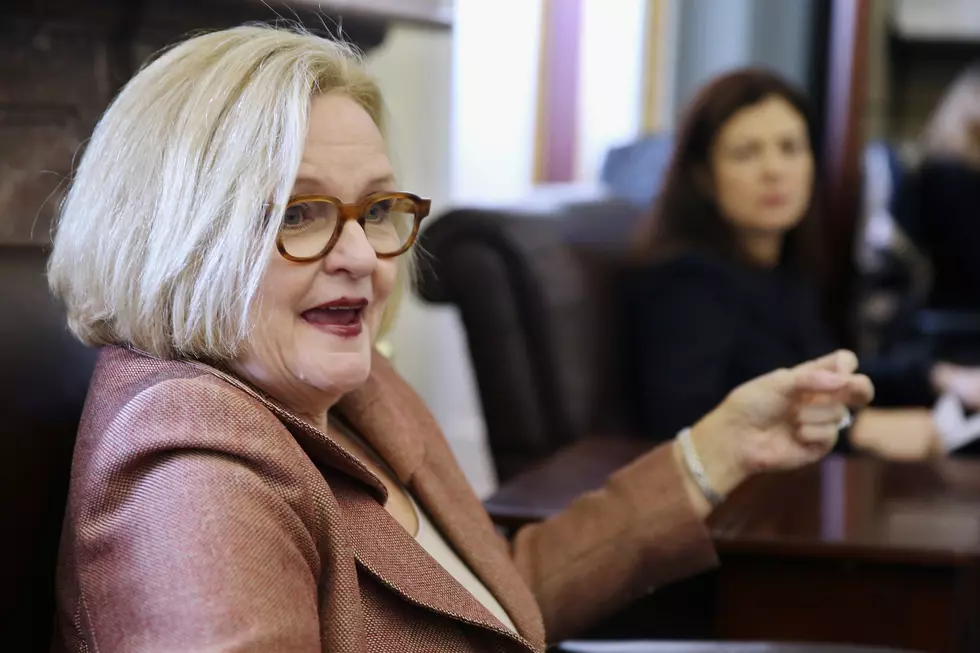
McCaskill: DEA Failed as Opioids Flowed into Missouri
The U.S. Drug Enforcement Agency concentrated on investigating doctors and pharmacies rather than holding three major drug distributors accountable while prescription opioids flowed into Missouri between 2012 and 2017, according to a report released by U.S. Sen. Claire McCaskill of Missouri.
McCaskill, the top Democrat on the U.S. Senate Homeland Security and Governmental Affairs Committee, released a report Wednesday that she said found the three distributors reported wildly different numbers of suspicious opioid shipments to the DEA but the agency didn't use its authority to issue immediate suspension orders to stop the questionable shipments, The Kansas City Star reported .
"What the report finds very clearly is something is wrong with the application of the law as it relates to reporting potential problematic distributions," McCaskill said. "Because clearly the law is not being applied the same way among these three major distributors, and it calls into question how effective the DEA is being in terms of overseeing the distribution of opioids in this country."
DEA spokesman Rusty Payne responded that the agency has started about 1,500 cases and made about 2,000 arrests a year during the last seven years and has increased its drug diversion squads from 46 in 2012 to 77 currently to address the opioid crisis.
"This is a huge part of what we're doing right now," Payne said.
Drug distributors McKesson, Cardinal Health and AmerisourceBergen, shipped 1.6 billion doses of opioids — or 260 doses for each person in the state to Missouri from 2012 to 2017, according to the report. The opioid infusion has caused hundreds of deaths and increased overdose-related trips to Missouri emergency rooms by more than 20 percent during that time.
Federal law requires drug distributors to report to the DEA orders of controlled substances that are suspicious because of their size, frequency or for being unusual for a particular pharmacy. The report found that AmerisourceBergen and McKesson shipped about the same number of opioid dosage units to Missouri during the years in question but made wildly varying reports of suspicious orders to the DEA. AmerisourceBergen told the committee it made 224 suspicious order reports to the DEA, while McKesson made 16,714 reports. Cardinal Health, which shipped about half as many units to Missouri as the other two, made 5,125 reports.
McCaskill's report stresses that the disparities didn't mean the companies are breaking the law.
"Someone is doing this wrong," McCaskill said, "and the fact that we had to uncover this as part of an investigation and the DEA is not on top of this and doesn't have a good explanation for it is really concerning."
Payne declined to speculate on the reasons for the discrepancies but noted the DEA has sanctioned all three distributors in the past for failing to stem suspicious opioid shipments, including a record $150 million settlement with McKesson last year.
McCaskill said issuing immediate suspension orders would be a more effective deterrent. But Payne said those orders are rare because they are more difficult to enforce than other enforcement actions.
But McCaskill's report cites former DEA officials who said a "revolving door" of employees moving between the agency and drug distributors produced conflicting loyalties, and the prospect of going up against corporate law firms intimidated DEA lawyers.
"According to a former assistant special agent in charge of the DEA Denver field division," the report says, "DEA attorneys would frequently ask, 'Why would you go after a Fortune 50 company that's going to cause all these problems with Ivy League attorneys, when we can go after other (DEA registrants) that are much lower, that are going to put up no fight?'"
The report was compiled from documents requested from the companies in July 2017 and information received from the DEA.
More From AM 1050 KSIS









